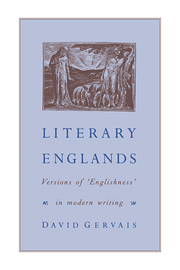Book contents
- Frontmatter
- Contents
- Preface
- Acknowledgements
- Abbreviations
- 1 The nineteenth century: pastoral versions of England
- 2 Edward Thomas: An England of ‘holes and corners’
- 3 Forster and Lawrence: exiles in the homeland
- 4 Late witness: George Sturt and village England
- 5 Contending Englands: F. R. Leavis and T. S. Eliot
- 6 Englands within England: Waugh and Orwell
- 7 Larkin, Betjeman and the aftermath of ‘England’
- 8 Geoffrey Hill and the ‘floating of nostalgia’
- Afterword: A homemade past
- Index
7 - Larkin, Betjeman and the aftermath of ‘England’
Published online by Cambridge University Press: 15 October 2009
- Frontmatter
- Contents
- Preface
- Acknowledgements
- Abbreviations
- 1 The nineteenth century: pastoral versions of England
- 2 Edward Thomas: An England of ‘holes and corners’
- 3 Forster and Lawrence: exiles in the homeland
- 4 Late witness: George Sturt and village England
- 5 Contending Englands: F. R. Leavis and T. S. Eliot
- 6 Englands within England: Waugh and Orwell
- 7 Larkin, Betjeman and the aftermath of ‘England’
- 8 Geoffrey Hill and the ‘floating of nostalgia’
- Afterword: A homemade past
- Index
Summary
Christopher Ricks has noticed how much of Larkin's work is ‘a version of pastoral, an apprehension of poignant contraries’. What is unusual about him is that his nostalgia should have been sustained by a relatively impoverished sense of history. ‘An Arundel Tomb’ discloses only a ‘scrap’ of the past to an ‘unarmorial age’, so that all its drama is reduced to only pathos. Scott could have drawn a whole novel out of such a tomb. To what extent does the continuity established by the poem's retrospection reveal to us a living tradition? Is the culture it embodies English – or merely post-English? To explore these questions, one needs to begin obliquely, with Betjeman. There are good grounds for seeing him as Larkin's point de repère. Jonathan Raban, at the end of Coasting, loyally sees Larkin himself as the voice of the age but Larkin's own candidate for the role would probably have been Betjeman.
To say ‘Betjeman’ today is to evoke the cuddly old reactionary who symbolised a vanishing ‘Englishness’ for a whole generation of television viewers. Even Larkin himself could describe the ‘spirit’ of this Betjeman as ‘backwards, inwards and downwards’. That was how he liked to think of his friend.
- Type
- Chapter
- Information
- Literary EnglandsVersions of 'Englishness' in Modern Writing, pp. 185 - 219Publisher: Cambridge University PressPrint publication year: 1993



